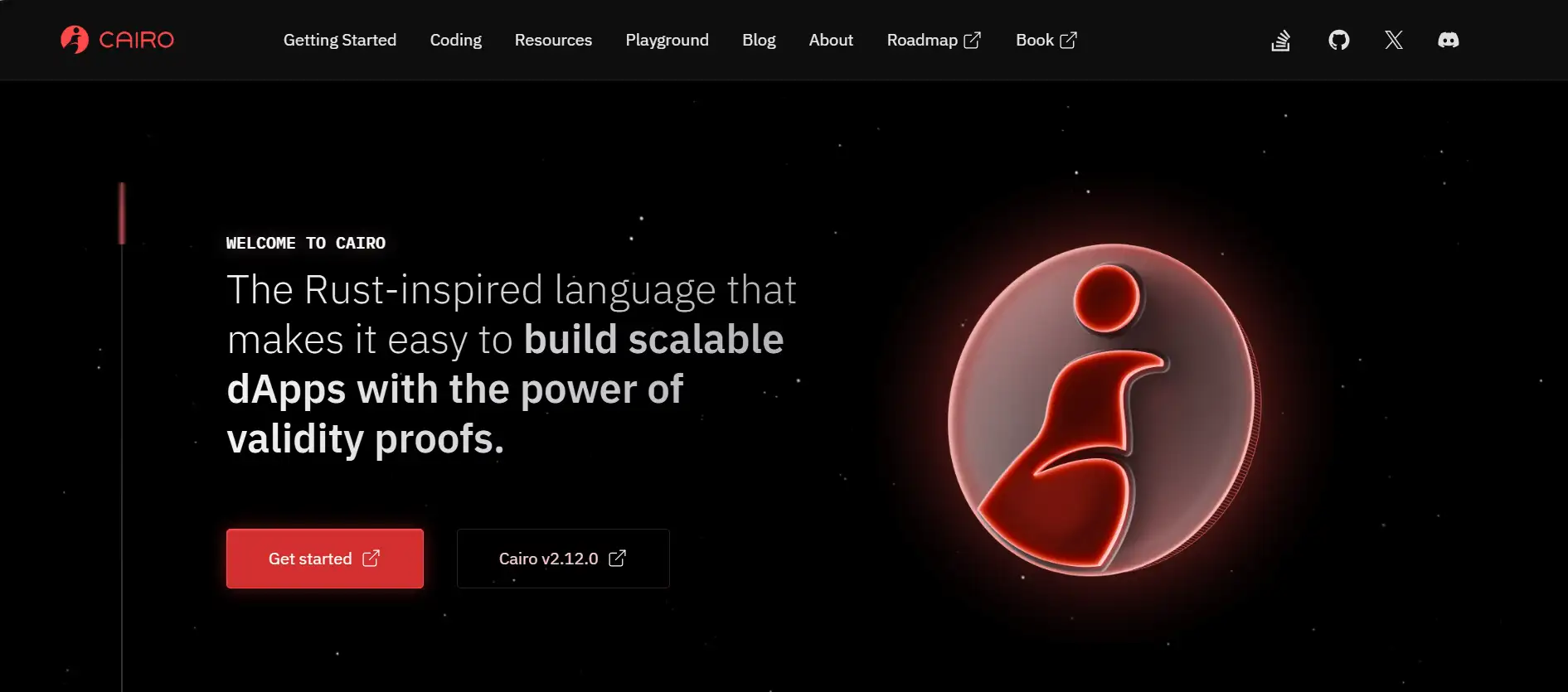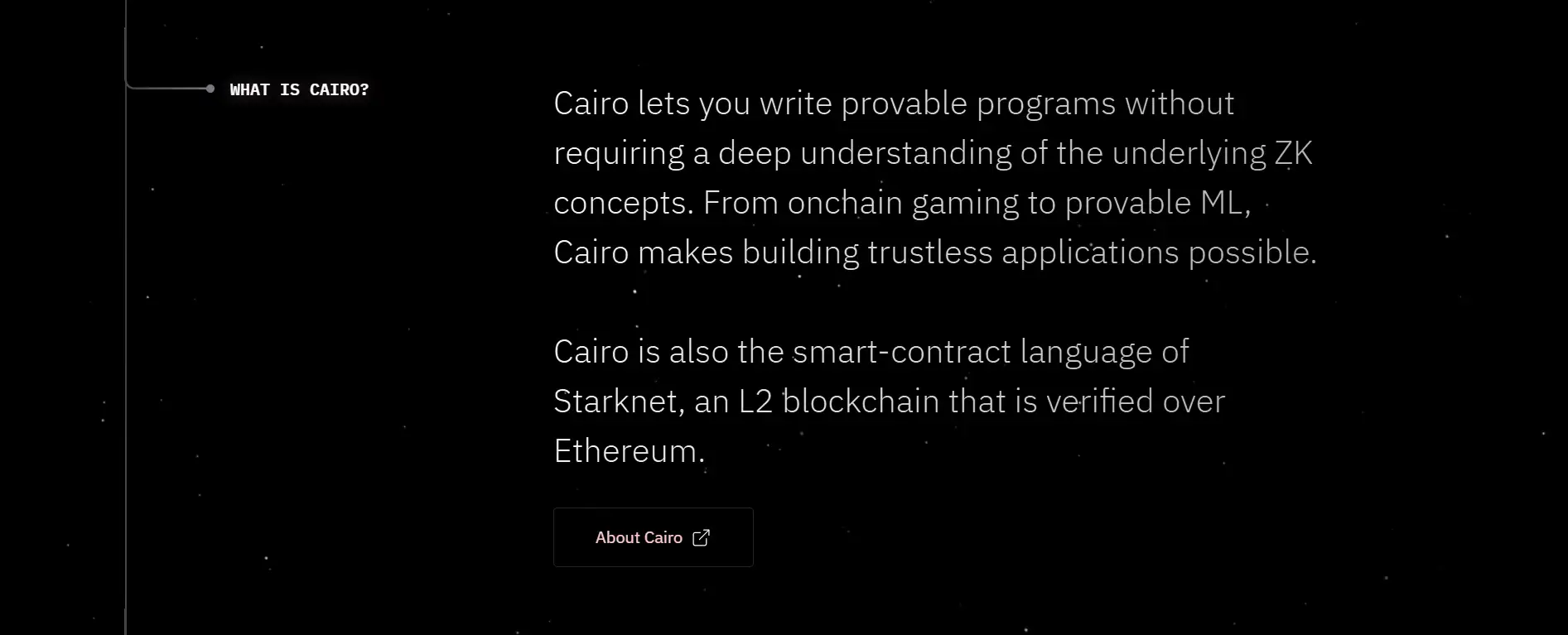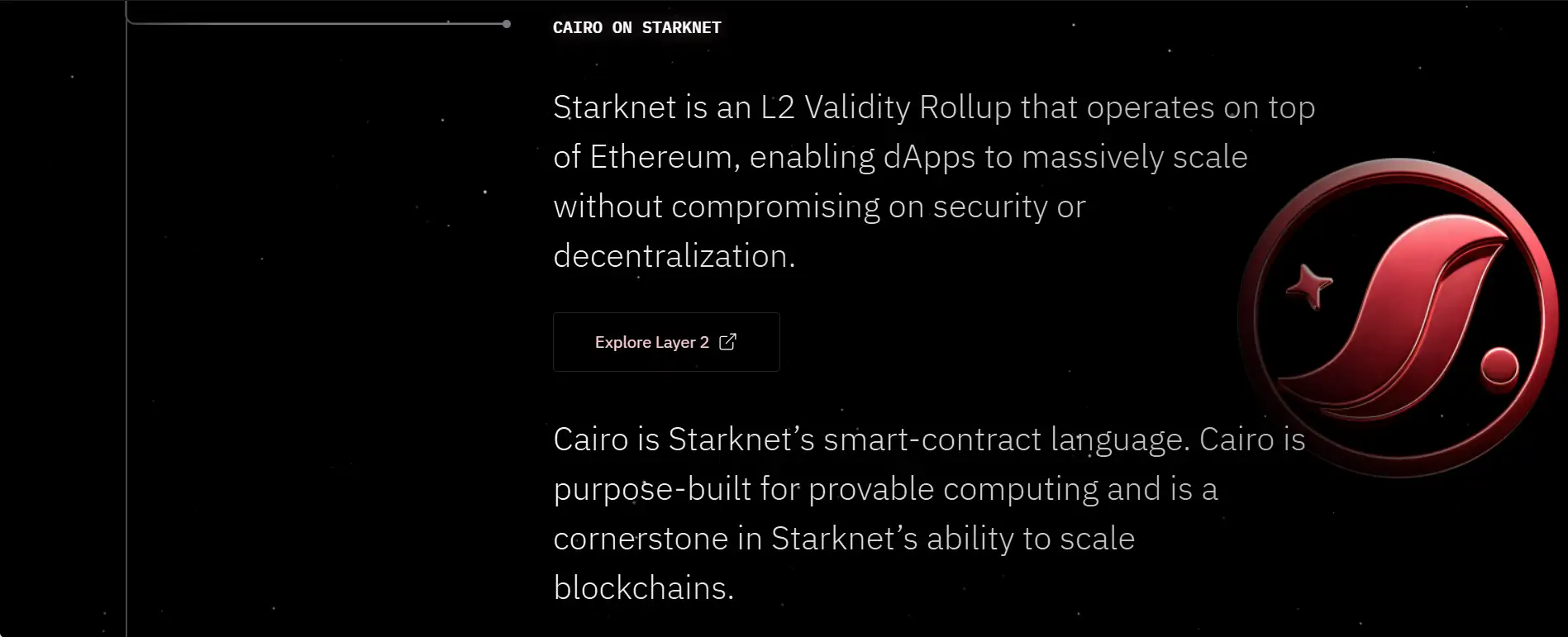About Cairo
Cairo is a cutting-edge programming language tailored for building scalable and provable applications on the blockchain. Inspired by Rust, Cairo abstracts away the complexities of zero-knowledge proofs (ZKPs), enabling developers to write trustless programs without needing deep mathematical expertise. Its integration with validity proofs allows for highly secure, efficient, and scalable execution—paving the way for new possibilities in onchain gaming, machine learning, and decentralized applications. By being purpose-built for provable computation, Cairo plays a central role in blockchain scalability and performance.
A foundational piece of the Starknet ecosystem, Cairo acts as the default smart contract language for this Layer 2 Validity Rollup that operates atop Ethereum. Cairo's structure is composed of three core components: the Cairo high-level language, the Sierra intermediate representation, and the CairoVM, a zk-friendly virtual machine. This full-stack solution enables developers to compile high-level logic into safe and verifiable zkVM code. You can learn more by visiting the Cairo official website.
Cairo is a comprehensive, full-stack solution designed to power the future of provable computation through a modular yet cohesive language architecture. It enables developers to create applications that can be mathematically verified, allowing for a new class of trustless and efficient decentralized apps (dApps). Built by StarkWare, Cairo was introduced to support the scalability and computational integrity needs of the Starknet network—a Layer 2 Validity Rollup on top of Ethereum. Cairo stands out by offering a seamless programming experience that combines the usability of Rust-like syntax with the cryptographic rigor of STARK-based zero-knowledge proof systems.
The Cairo stack comprises three integral layers: the Cairo language (inspired by Rust), Sierra (a safe intermediate representation that ensures secure smart contract execution), and the CairoVM (a zk-friendly virtual machine designed for fast proof generation). This stack is tailored not only for writing and deploying smart contracts on Starknet, but also for enabling offchain computations where privacy and resource savings are crucial. By decoupling itself from EVM constraints, Cairo introduces a new paradigm of programming that supports highly advanced and efficient application development.
One of the most powerful aspects of Cairo is that it allows developers to write provable code with minimal knowledge of ZKPs. It compiles code into a unique, proof-friendly format, ensuring that execution can be efficiently verified without full re-computation. This is ideal for large-scale applications such as onchain games, verifiable machine learning models, and enterprise systems requiring tamper-proof data verification.
Cairo integrates tightly with Starknet, leveraging its secure and decentralized infrastructure. Applications built using Cairo benefit from Starknet’s scalability while still enjoying Ethereum’s base-layer security. This has led to a rapidly growing developer ecosystem, with comprehensive documentation, tutorials like The Cairo Book, and tools like Scarb, OnlyDust, and Starklings enhancing the learning and building experience.
Cairo competes with other zk-rollup and zkVM-based technologies like:
- Polygon zkEVM – A zkEVM-compatible solution focused on Ethereum scaling.
- Scroll – Another zkEVM project aimed at achieving native compatibility with Ethereum.
- zkSync – A zk-rollup using a custom VM, focused on high throughput and low fees.
To learn more or get involved with the Cairo ecosystem, visit the official Cairo website, which provides resources such as documentation, interactive coding tutorials, roadmap updates, and more.
Cairo provides numerous benefits and features that make it a leading platform in the scalable smart contract development and zero-knowledge computing ecosystem:
- Developer-Friendly Syntax: Cairo uses a Rust-inspired syntax, making it accessible to developers familiar with modern programming languages. It simplifies the creation of provable programs by abstracting complex cryptographic details.
- Efficient Proof Generation: Cairo compiles code into an ad-hoc assembly format engineered specifically for high-performance zero-knowledge proof systems. This enables fast and scalable verification of computation.
- Powerful Tech Stack: The platform includes CairoVM, the Sierra intermediate representation, and its Scarb package manager, creating a complete toolchain for provable application development.
- Seamless Starknet Integration: Cairo is the native language of Starknet, a leading Layer 2 scaling solution for Ethereum. This allows developers to leverage Starknet's scalability and Ethereum’s base-layer security.
- Onchain and Offchain Support: Cairo supports both onchain smart contracts and offchain provable computations, enabling private data handling and reduced onchain resource consumption.
- Rich Learning Resources: Extensive learning tools like The Cairo Book, Starklings, and OnlyDust connect developers with tutorials, guides, and community projects.
- Innovation Beyond EVM: Unlike zkEVM-based tools, Cairo is not limited by Ethereum’s virtual machine, enabling more flexibility and innovation in smart contract logic and design.
Getting started with Cairo is streamlined and accessible for developers at all levels, whether you're deploying smart contracts on Starknet or exploring offchain provable computing:
- Install Scarb: Begin by installing Scarb, Cairo’s package manager inspired by Rust’s Cargo. It bundles the Cairo compiler and language server for easy development.
-
Create a New Project: Use
scarb new hello_cairoin your terminal to generate a new project with default files and test configurations. -
Write and Test Code: Edit
src/lib.cairoto add your functions. Usescarb cairo-runto execute code andscarb testto run unit tests. - Use the Cairo Playground: Try Cairo in your browser without setup via the Cairo Playground.
- Learn from the Cairo Book: Dive into the official guide, The Cairo Book, for in-depth tutorials and smart contract examples.
- Explore Developer Tools: Access tools like Starklings, Scarb, OnlyDust, and extensive library docs through the Resources page.
- Join the Community: Get support and collaborate via Twitter or by asking questions on Stack Overflow.
Cairo FAQ
Cairo simplifies zero-knowledge programming by using a Rust-like syntax that abstracts the cryptographic complexity while preserving the ability to write low-level logic. This design lets developers write efficient provable code without needing deep mathematical knowledge, making it easier to build scalable and verifiable applications. Learn more at the official site.
Sierra is Cairo’s intermediate representation that ensures safety and resource constraints before compiling code into the CairoVM. It acts as a secure layer that enforces provable execution rules, allowing smart contracts to remain auditable and error-resistant throughout the stack. Learn more at the Cairo homepage.
Yes, Cairo supports building offchain provable applications where sensitive data remains private. Developers can generate zero-knowledge proofs that validate logic without revealing raw inputs, enabling secure applications in identity, AI, and enterprise use cases. Visit cairo-lang.org to explore these features.
Cairo strikes a balance between developer usability and proof generation integrity through tools like Scarb, type safety, and structured debugging. Developers enjoy a smooth coding experience while the stack guarantees verifiability and security. Read more at the official Cairo website.
Cairo is ideal for Rust developers, blockchain engineers, and anyone building scalable, verifiable applications without the limitations of EVM. It’s a perfect fit for projects in onchain gaming, ZK machine learning, and privacy-preserving protocols. Explore more at cairo-lang.org.
You Might Also Like












